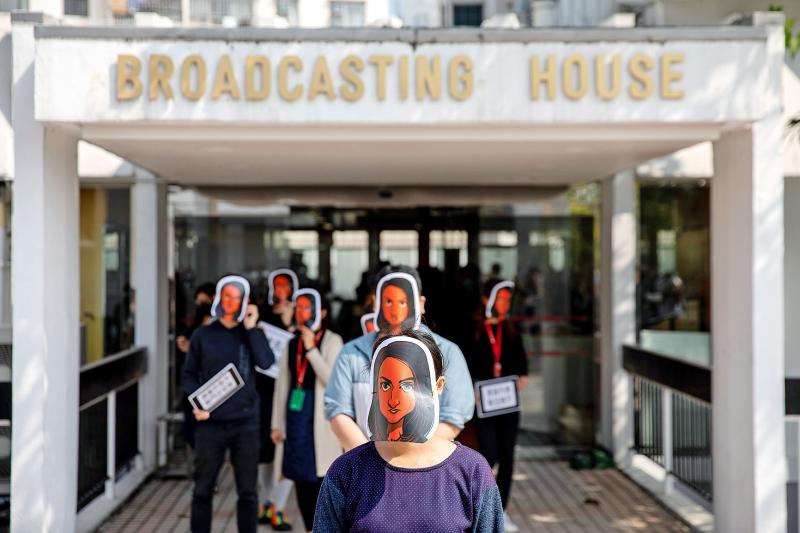The Hong Kong government’s review of Radio Television Hong Kong (RTHK) has found deficiencies in editorial management and a lack of transparency in handling complaints, signaling a major overhaul of the revered institution as concerns grow over media freedom.
The only independent, publicly funded media outlet on Chinese soil, RTHK was founded in 1928 and is sometimes compared with the BBC.
Its charter guarantees it editorial independence.

Photo: EPA-EFE
The broadcaster angered the Hong Kong government, the police and Beijing with its coverage of anti-government protests in 2019, including several investigations that sparked widespread criticism of the authorities.
“There are deficiencies in [the] editorial management mechanism,” the Hong Kong Commerce and Economic Development Bureau said in a 154-page report of its review released yesterday.
There were “no well-defined and properly documented editorial processes and decisions,” and no “clear allocation of roles and responsibilities among editorial staff,” it said. “Weak editorial accountability is observed.”
The government-led review focusing on aspects of RTHK’s governance and management was announced last year, spanning the issues of administration, financial control and personnel.
However, the union of the broadcaster’s staff said that the review “challenges the bottom line of logic.”
“Editorial autonomy has vanished into nothing,” it added.
Earlier yesterday, Hong Kong appointed Deputy Secretary for Home Affairs Patrick Li (李百全) as director of broadcasting, from March 1.
Li, a career bureaucrat who worked in the government’s constitutional and mainland affairs and security bureaus, but has no experience in media, is to replace veteran journalist Leung Ka-wing (梁家榮), six months before his contract expires.
Leung, whose management the review described as too “passive,” was not thanked for his service in the appointment notice, contrary to practice.
Beijing has said that patriots must run every public institution in Hong Kong.
The broadcaster “serves residents of the territory instead of bureaucrats,” its staff union said.
Pro-Beijing supporters regularly file complaints against RTHK and stage protests outside its headquarters, accusing it of anti-government bias.
Last week, RTHK said it was suspending the relay of BBC radio news after China barred the BBC World News service from its networks, highlighting how the territory’s media are falling under Beijing’s tightening sway.

Right-wing political scientist Laura Fernandez on Sunday won Costa Rica’s presidential election by a landslide, after promising to crack down on rising violence linked to the cocaine trade. Fernandez’s nearest rival, economist Alvaro Ramos, conceded defeat as results showed the ruling party far exceeding the threshold of 40 percent needed to avoid a runoff. With 94 percent of polling stations counted, the political heir of outgoing Costa Rican President Rodrigo Chaves had captured 48.3 percent of the vote compared with Ramos’ 33.4 percent, the Supreme Electoral Tribunal said. As soon as the first results were announced, members of Fernandez’s Sovereign People’s Party

EMERGING FIELDS: The Chinese president said that the two countries would explore cooperation in green technology, the digital economy and artificial intelligence Chinese President Xi Jinping (習近平) yesterday called for an “equal and orderly multipolar world” in the face of “unilateral bullying,” in an apparent jab at the US. Xi was speaking during talks in Beijing with Uruguayan President Yamandu Orsi, the first South American leader to visit China since US special forces captured then-Venezuelan president Nicolas Maduro last month — an operation that Beijing condemned as a violation of sovereignty. Orsi follows a slew of leaders to have visited China seeking to boost ties with the world’s second-largest economy to hedge against US President Donald Trump’s increasingly unpredictable administration. “The international situation is fraught

MORE RESPONSIBILITY: Draftees would be expected to fight alongside professional soldiers, likely requiring the transformation of some training brigades into combat units The armed forces are to start incorporating new conscripts into combined arms brigades this year to enhance combat readiness, the Executive Yuan’s latest policy report said. The new policy would affect Taiwanese men entering the military for their compulsory service, which was extended to one year under reforms by then-president Tsai Ing-wen (蔡英文) in 2022. The conscripts would be trained to operate machine guns, uncrewed aerial vehicles, anti-tank guided missile launchers and Stinger air defense systems, the report said, adding that the basic training would be lengthened to eight weeks. After basic training, conscripts would be sorted into infantry battalions that would take

GROWING AMBITIONS: The scale and tempo of the operations show that the Strait has become the core theater for China to expand its security interests, the report said Chinese military aircraft incursions around Taiwan have surged nearly 15-fold over the past five years, according to a report released yesterday by the Democratic Progressive Party’s (DPP) Department of China Affairs. Sorties in the Taiwan Strait were previously irregular, totaling 380 in 2020, but have since evolved into routine operations, the report showed. “This demonstrates that the Taiwan Strait has become both the starting point and testing ground for Beijing’s expansionist ambitions,” it said. Driven by military expansionism, China is systematically pursuing actions aimed at altering the regional “status quo,” the department said, adding that Taiwan represents the most critical link in China’s